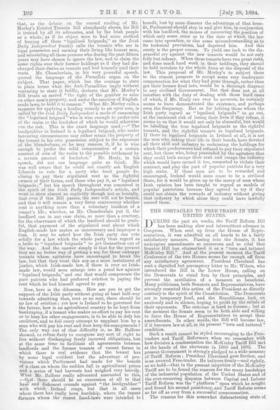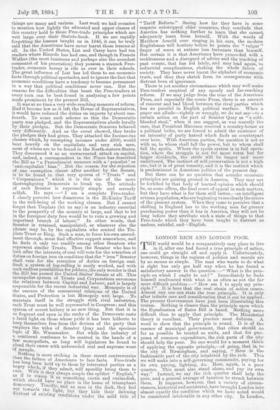THE OBSTACLES TO FREE TRADE IN THE UNITED STATES. DURING
the past six weeks, the Tariff Reform Bill jJ has been making slow and intermittent advance in Congress. When sent up from the House of Repre- sentatives, it was admitted on all hands to be a fairly satisfactory measure. Passing into the Senate, it has undergone amendments so numerous and so vital that Senator Hill has stigmatised it as a " torn and tattered McKinley Bill." And at the present moment the Tariff Conference of the two Houses seems far enough off from any satisfactory agreement. President Cleveland has sent a dignified but peremptory letter to Mr. Wilson, who introduced the Bill in the Lower House, calling on the Democrats to stand firm by their principles, and prevent the mutilation of a measure so beneficial. Many politicians, both Senators and Representatives, have strongly resented this action of the President as directly contrary to the spirit of the Constitution. The Democrats are in temporary feud, and the Republicans look on anxiously and in silence, hoping to profit by the cabals of their opponents. The outcome is hard to foresee ; but at the moment the Senate seem to be both able and willing to force the House of Representatives to accept their amendments. In. other words, the Bill will become law, if it becomes law at all, in its present " torn and tattered" condition.
Such a result cannot be styled encouraging to the Free- traders and Tariff Reformers when we remember with how decisive a condemnation the McKinley Tariff Bill met at the hands of the electorate in 1890 and 1892. The present Government is strongly pledged to a wide measure of Tariff Reform ; President Cleveland goes further, and is an avowed Free-trader. He believes firmly—and rightly, as we hold—that in the present iniquities of the McKinley Tariff are to be found the reasons for the many hardships of the industrial population of the United States and of the ever-recurring disputes between Capital and Labour Tariff Reform was the " platform" upon which he sought and found his second presidency, and Tariff Reform seems as far off as ever from a successful consummation.
The reasons for this somewhat disheartening state of things are many and various. Last week we had occasion to mention how lightly the educated and upper classes of this country hold to those Free-trade principles which are writ large over their Statute-book. If we are rapidly forgetting the lessons taught us in 1846, it can be truly said that the Americans have never learnt those lessons at all. In the United States, List and Carey have had ten readers where Ricardo has had one, and though in Francis Walker (the most luminous and perhaps also the soundest economist of his generation) they possess a staunch Free- trader, economic heresy is rife as ever in their schools. The great influence of List has led them to see economic facts through political spectacles, and to ignore the fact that economic conditions have a tendency to become permanent in a way that political conditions never can. But the reasons for the difficulties that beset the Free-traders at every turn can be best found in analysing a few points made prominent by the present Bill. It was at no time a very wide-reaching measure of reform. Had it become law as it left the House of Representatives, it would have reduced the duties on imports by about one- fourth. To some such scheme as this the Democratic party was pledged, and the Representatives abode loyally by their pledges. But the Democratic Senators behaved very differently. And as the event showed, they broke the pledges they had given. They attacked the Income-tax clauses which, by exempting incomes under £800, would bear heavily on the capitalists and very rich men, most of whom are to be found in the North-eastern States. They denounced it as an unwarranted attack on capital, and, indeed, a correspondent in the Times has described the Bill as " a Protectionist measure with a ' populist' or `anti-capitalist' bias." But the reason for the rejection of one exemption clause after another by the Senate, is to be found in that very system of " Trusts " and " Corporations " which it is the aim of the more thoroughgoing Democrats to break up. The attitude of each Senator is supremely simple and serenely selfish. He says :—" I am a. complete Free-trader. I clearly perceive how disastrous is the McKinley Tariff to the well-being of the working classes. But I cannot forget that Tinplate (let us say) is an industry essential to the prosperity of the country at large, and that to let in the foreigner duty free would be to ruin a growing and important branch of labour." In other words, that Senator is retained, manipulated, or whatever else the phrase may be, by the capitalists who control the Tin- plate Trust or Ring. Such a man, to force his own amend- ment through, must find effective support somewhere, and he finds it only too readily among other Senators who represent similar Trusts. Thus the Senator who has to look after the interests of coal will vote for the retention of duties on foreign iron on condition that the " iron " Senator shall vote for the retention of duties on foreign coal. Such a system of log-rolling is easily worked, and with such endless possibilities for jobbery,the only wonder is that the Bill has passed the United States' Senate at all. This monopolist system of Trusts and Corporations envenoms the relations between Capital and Labour, and is largely responsible for the recent industrial war. Monopoly is of the essence of the commercial relations of the United States, and Protection is but Monopoly writ large. To maintain itself in the struggle with rival industries, each Trust must be well represented in Congress ; and this system of covert bribery is no new thing. But that it is so flagrant and open in the ranks of the Democrats casts a lurid light on those whose pride it has been hitherto to keep themselves free from the devices of the party that employs the wiles of Senator Quay and the specious logic of Mr. Wanamaker. But while the industry of a continent continues to be centred in the hands of a few monopolists, so long will legislators be found to plead their cause with unbounded zeal and supreme want of scruple. _ Nothing is more striking in these recent controversies than the failure of Americans to face facts. Free-trade has long been held up to them by interested parties as a bogey which, if they admit, will speedily bring them to ruin. With it they always Couple the epithet " English," as if to stamp it as something exotic and outlandish, which should have no place in the home of triumphant democracy. Timidly, and as men in the dark, they feel out towards the light, but they bide their dawning distrast of existing conditions under the mild title of " Tariff Reform." Seeing how far they have in some respects outstripped older countries, they conclude that America has nothing further to learn that she cannot, adequately learn from herself. With the words of Matthew Arnold ever ringing in his ears, the modern Englishman will hesitate before he points the " vulgar " finger of scorn at nations less fortunate than himself. But certain it is that Americans have proceeded with a recklessness and a disregard of advice and the teaching of past events, that has led lately, and may lead again, to industrial complications, shaking the whole fabric of society. They have never learnt the alphabet of economic truth, and thus they shrink from its consequences with distrust born of ignorance. There is yet another circumstance which may well make Free-traders sceptical of any speedy and far-reaching reform. If we may judge from the tone of the American Press, and especially the comic Press, there is an amount of rancour and bad blood between the rival parties which has no parallel in English political warfare. When a. paper can allude—rightly or wrongly, we do not say—to a. certain action on the part of Senator Quay as " a cold- blooded steal," when it can suggest, as was recently the case, that President Harrison received a country-house as- a political bribe, we are forced to admit the existence of an intensity of party hatred which finds no counterpart over here. With American parties, the question is not as. with us, to whom shall fall the power, but to whom shall fall the spoils. Where the spoils system is in full opera- tion, where the struggle is not for more votes but for larger dividends, the strife will be longer and more embittered. The instinct of self-preservation is not a high• one, but it is of great tenacity, and it is the instinct which is predominant in American politics of the present day. But there can be no question that sounder economic principles are gaining ground in America. They may not be fortified by that body of learned opinion which should be, as some affirm, the final court of appeal in such matters,. but they have what is for them still better,—an intelligent artisan population, who are beginning to see clearly the errors of the present system. When they come to perceive that a. shilling in England has to the working man far greater purchasing power than it has in America, they will not be long before they attribute such a state of things to that Free-trade which they have been taught 'to distrust ea• useless, suicidal, and—English.



































 Previous page
Previous page